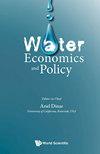Water Scarcity and Conflict Between Upstream and Downstream Riparian Countries
IF 1
4区 经济学
Q3 ECONOMICS
引用次数: 4
Abstract
More than one-quarter of the world’s population lives in water-scarce areas, while most countries share at least one transboundary river. If water scarcity is this prevalent, should we expect riparian countries to fight over the water allocation of shared rivers? To answer this question, I develop a modified one-shot three-stage river-sharing game where countries can resort to force to solve their water allocation problem. Using backward induction, I solve for the probability of the downstream country initiating conflict against the upstream country and the likelihood of the latter responding with force to the former’s hostile actions. I test the model empirically using a set of all upstream–downstream riparian dyads with available data from AQUASTAT and the Correlates of War Project for the years 1960–2010. The main contribution of this paper is that it demonstrates how upstream and downstream riparian countries differ in their decision to use force against the other country when experiencing water scarcity. I find that water scarcity increases the likelihood of the downstream country initiating the conflict, but it has no effect on the upstream country’s likelihood of responding with force. If history is a predictor of the future, then the results imply that as more riparian countries become water-scarce, militarized conflicts between upstream and downstream countries are likely to increase, especially if there is heterogeneity in water availability between the riparian dyad.缺水与上下游河岸国家的冲突
世界上超过四分之一的人口生活在缺水地区,而大多数国家至少有一条跨界河流。如果水资源短缺如此普遍,我们是否应该期待沿岸国家为共享河流的水资源分配而斗争?为了回答这个问题,我开发了一个修改后的一次性三阶段河流共享游戏,各国可以诉诸武力来解决其水资源分配问题。使用后向归纳法,我求解了下游国家对上游国家发动冲突的可能性,以及后者对前者的敌对行动作出武力回应的可能性。我使用一组所有上下游河岸二元体,利用AQUASTAT和战争相关性项目1960年至2010年的可用数据,对该模型进行了实证测试。本文的主要贡献是,它展示了上游和下游沿岸国家在面临缺水时对另一个国家使用武力的决定是如何不同的。我发现,缺水增加了下游国家发动冲突的可能性,但对上游国家武力应对的可能性没有影响。如果历史是未来的预测因素,那么研究结果表明,随着越来越多的沿岸国家缺水,上下游国家之间的军事冲突可能会增加,尤其是如果沿岸国家之间的水资源可用性存在异质性。
本文章由计算机程序翻译,如有差异,请以英文原文为准。
求助全文
约1分钟内获得全文
求助全文

 求助内容:
求助内容: 应助结果提醒方式:
应助结果提醒方式:


